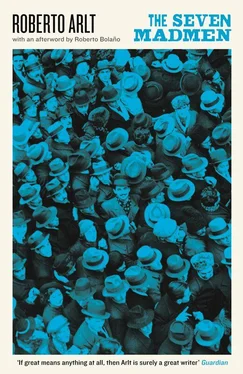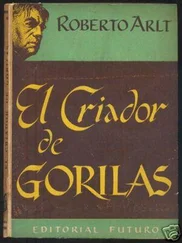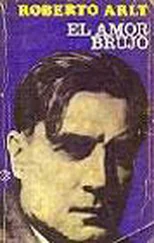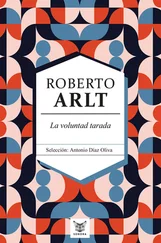This was the explanation Erdosain reached when he felt the first nauseas of despair.
“What am I doing with my life?” he would ask himself, trying with that question to shed light on the origins of this anxiety which led him to long for an existence where the next day would not be merely time measured out in a repetition of today, but something different and totally unexpected, like in the plots of North American films, where yesterday’s tramp suddenly becomes today’s secret society boss, and the gold-digging secretary turns out to be a multimillionairess in disguise.
In the miserable uncertainty that followed, this need for marvels that he could not possibly satisfy — since he was no more than a failed inventor and a criminal on the threshold of gaol — left the acid taste of frustration in Erdosain’s mouth, setting his teeth on edge as if he had been chewing lemons.
When in this mood, he dreamt up the wildest nonsense. He even imagined that the rich, tired of having to listen to the moans of the wretched, built huge cages pulled by teams of horses. Gaolers chosen for their strength hunted the poor with dogcatchers’ poles, and Erdosain could clearly see one scene where a tall, dishevelled woman was chasing after a cage where her one-eyed son was calling out to her, until finally a “dogcatcher”, weary of hearing her cries, beat her senseless with the handle of his pole.
As this apparition faded, Erdosain said, horrified at himself: “But what soul, what kind of soul do I have?” and since his mind was still being propelled by the impulse that had produced the nightmare, he added: “I should have been born a lackey, one of those vile, perfumed lackeys whom rich prostitutes use to do up their bodices, while their lover is lolling on the sofa smoking a cigarette.”
His thoughts flew off once more, this time down into a kitchen in the basement of a luxury mansion. Around the table were gathered two maids, a chauffeur and a levantine trader selling garters and perfumes. On this occasion, Erdosain himself would be wearing a short black jacket not long enough to cover his backside, and a white tie. All of a sudden the “master” would call him, a man who was his mirror image, except that he did not shave his moustaches and wore glasses. Erdosain had no idea what his master wanted of him, but would never forget the strange look he gave him as he left the room. Then he went back to the kitchen to swap dirty stories with the chauffeur, who to the maids’ great amusement, and complete silence from the Arab pederast, was telling of how he had seduced the daughter of a high society lady, a girl of tender years.
Erdosain said again to himself: “Yes, I am a lackey. I have the soul of a true lackey,” and clenched his teeth in satisfaction as he insulted and degraded himself in this way.
At other times he saw himself leaving a devout old spinster’s bedroom, unctuously carrying a heavy chamberpot. Suddenly he was accosted by a priest — a regular visitor to the house — who asked him, smiling beatifically: “And how are your religious duties going, Ernesto?” And he, Ernesto, Ambrosio or Jose, was living the sordid life of an obscene, hypocritical servant.
Whenever he thought like this, a spasm of madness ran right through him.
Erdosain knew only too well he was gratuitously offending and fouling his soul. As he deliberately delved into the mire, he suffered the same terror as someone who dreams they are falling into an abyss but knows they will not die.
Sometimes he felt compelled to humiliate himself, like saints do when they kiss the wounds of plague-bearers; not out of compassion, but so that they will be more worthy of God’s mercy, even though He is revolted at the way they are seeking heaven through such disgusting tests of faith.
But once these images had vanished and all that was left in his mind was the “desire to know the meaning of life”, he would say to himself: “No, I’m not a lackey … truly, I’m not …” and he wished only to go and beg his wife to take pity on him for all these horrible, sordid thoughts. But the memory that he had been forced to sacrifice himself so often for her filled him with a blind rage, and soon he found himself wanting to kill her.
He knew for certain that one day she would give herself to another man, and this was a further element he could count on to add to all his other anguish.
When he stole the first twenty pesos, Erdosain was amazed at the ease with which “that” could be done — perhaps because before he did so, he thought he would have to overcome a whole host of scruples which given his circumstances he could not possibly accommodate. So he said to himself:
“It’s simply a question of having the will power and doing it.”
And there was no doubt “that” made life easier; thanks to “that” he had money, which made him feel strange, because it had cost him no effort to get it. And what disturbed Erdosain most was not the theft as such, but that his being a thief might show on his face. He was forced to rob because he earned such a pittance each month. Eighty, a hundred, or a hundred and twenty pesos, according to how much he collected, because his wage included a commission for every cent he brought in.
Some days he carried around four or five thousand pesos, while he went hungry, and had to bear the stench of an imitation leather bag inside which lay happiness in the form of banknotes, cheques, money transfers, payment orders.
For a long while, despite the misery gradually eating away at his house and home, the idea of stealing from the company had never occurred to him.
His wife reproached him for having to scrimp and save every day; he listened to her reproaches in silence, but when he was on his own would say to himself: “What would she have me do?”
When he had the idea, when the glimmer of an idea occurred to him that he could cheat on his bosses, he felt as delighted as if he had thought of a new invention. Stealing? Why hadn’t he thought of it before?
Erdosain was dismayed at his own feebleness. He even criticised himself for lacking initiative — at that time (this was three months prior to the events narrated here) he was having to do without most things, even though large sums of money passed through his hands every day.
And what aided and abetted his fraudulent dealings was the Sugar Company’s negligence.
Without doubt Erdosain led a strange life, because sometimes a sudden hope propelled him into the street.
He would catch a bus and get off in Palermo or Belgrano. As he walked along the silent avenues lost in thought, he would say to himself: “A young woman will see me, a tall, pale, intense girl out driving her Rolls-Royce just for the sake of it. She will be driving round sadly. All at once she will spot me and understand I am the love of her life, and that look of hers — until that moment, an insult to the unfortunate — will settle on me — and her eyes will fill with tears.”
This was how Erdosain’s foolish fantasy played itself out as he walked slowly along in the shade of the tall house fronts and the green plane trees, which cast their triangular shadows on to the pavement’s white mosaics.
“She’ll be a millionairess, but I’ll say to her: ‘I’m sorry, but I can’t touch you. Even if you wanted to give yourself to me, I would not have you.’ She would look at me in astonishment, and I would tell her: ‘It’s no use, you see, it’s no use because I’m married.’ But she’ll offer Elsa a fortune to divorce me, and then we will wed, and sail off to Brazil on her yacht.”
That word “Brazil” gave his naive dream an exotic richness; rough and warm, it conjured up for him a pink and white coastline with cliffs and rocks plunging into a warm blue sea. Soon the young maid had lost her tragic air — beneath the white silk of a simple schoolgirl’s dress she was a happy, smiling creature, timorous yet daring.
Читать дальше











